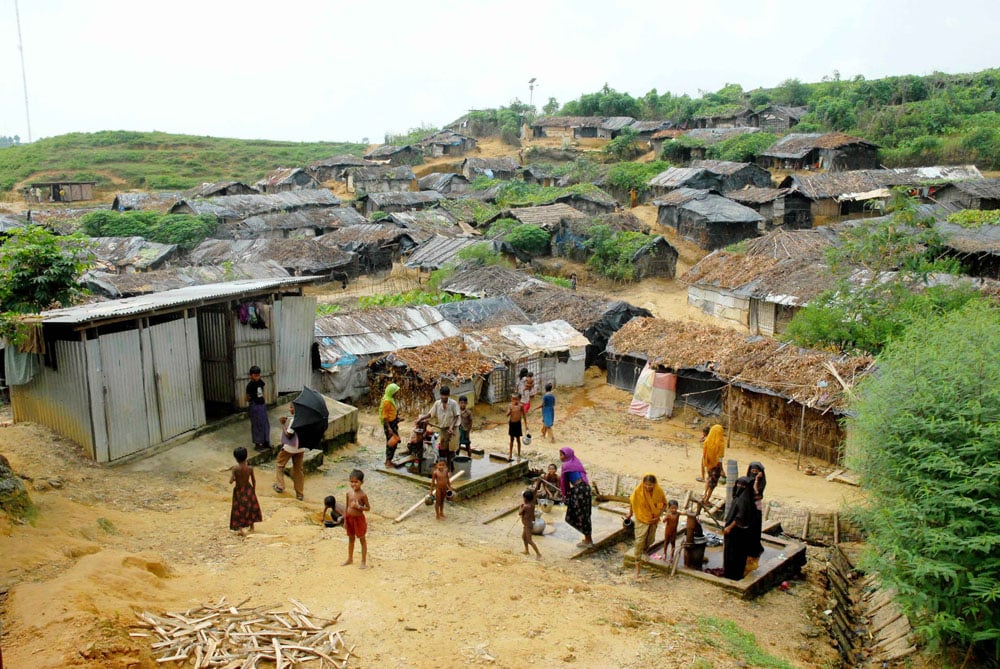Human rights
U.N. suspends aid to the 250,000 displaced rohingya
Pogroms continue and it is now a war of numbers: the government accuses the guerrilla of burning houses and villages.

While the UN Food Program has decided to suspend aid in the Burmese state of Rakhine where, since Aug. 25, the latest pogrom against the rohingya minority rages, the Myanmar military also triggered a war of numbers.
Government sources have indicated that a total of 2,625 homes flared in the villages of Kotankauk, Myinlut and Kyikanpyin and in two districts. But these homes were supposedly torched by the ARSA (Arakan Rohingya Salvation Army), the “terrorist” armed group responsible for the August attacks.
This count does not match the testimonies of the displaced people and the research conducted by Human Rights Watch. They accuse the military for these fires. “New images show the total destruction of a Muslim village and are seriously raising the concern that this state of devastation in the north of the Rakhine may be far greater than we thought, “said to Reuters Asia’s deputy director of the organization, Phil Robertson. In that village, 99 percent of the buildings went into smoke.
According to the United Nations High Commissioner for Refugees, at least 58,000 people are fleeing to Bangladesh, suggesting that the pogrom is even larger than last October, when thousands fled to the neighboring country.
But today, conditions have changed and Bangladesh is resisting. It wants to avoid another invasion of refugees in a country where poverty and overpopulation are two constants. In the meantime, people are trapped in the no man’s land between the two countries while the flow to the frontier does not stop.
UN Secretary-General Guterres expresses “serious concern” but his words amount to little. His concern, in return, has translated into actions: the Rome-based agency stopped the distribution of food aid to rohingya in Myanmar, where there are more than 250,000 internally displaced persons, half of whom live in camps built to shelter them in 2012 (when a campaign triggered destruction and violence in several Muslim areas of the country).
In October 2016, because of additional attacks, the military banned the humanitarian agencies from intervening, thus giving rise to mass emigration.
According to Al Jazeera, the Pam has been accused by the government of providing food rations then ended up in the hands of the rebels. These same accusations were launched against other humanitarian agencies.
As the Italian case demonstrates, when a government’s plans violate the basic rules of the law, the guilty government usually starts a campaign demonizing NGOs and humanitarian organizations, which are guilty of being neutral and assisting those in need without asking questions.
Sometimes, things happen in reverse. While it is true that the Dacca government is trying to put a brake on the immigration of new displaced people, a BBC correspondent reported from Cox Bazar, the border city where the Refugee Committee is based, that the Bangladesh police are partly ignoring orders coming from above and closing an eye when they see fleeing people crossing the frontier.
It may also happen that Bangladesh holds two positions: one official, the other — hidden — humanitarian. A country stricken with disastrous monsoon rains, with 1145 people per square kilometer and an average income of $160 a month, is giving a lesson of civilization, welcoming those who run away from the war.
In its refugee camps, tens of thousands of displaced people live and there are at least half a million rohingya now living in the country, after successive waves.
Meanwhile, the Indian Prime Minister Modi is expected to visit Myanmar. The agenda includes the issue of the rohingya. India wants to expel 40,000. It is hard to believe that Naypyidaw will want them back.
Originally published at https://ilmanifesto.it/lonu-sospende-gli-aiuti-ai-250mila-rohingya-sfollati/ on 2017-09-03
